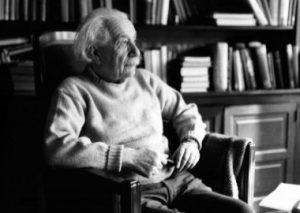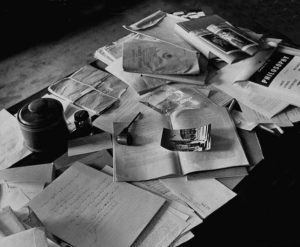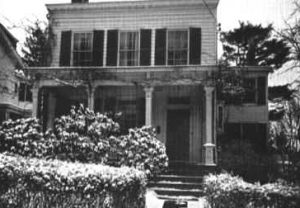 For many years, I have admired Albert Einstein. His mind and his level of intelligence intrigued me, as did his quirkiness. When you think of a genius, your mind automatically produces a picture of a very organized person, who is able to handle any situation, but even geniuses have their issues with things. One well know “weakness” for Einstein was the fact that if something can be written down, it need not take up space in his brain. His brain was very full after all, and clutter was always an issue. That said, if he couldn’t find his train ticket…for the train he took every day from home to work and back…he didn’t know at which stop to get off, because he relied on his ticket to tell him that. I don’t think most of us could even begin to filter our brain in such a way…but Einstein could, and did.
For many years, I have admired Albert Einstein. His mind and his level of intelligence intrigued me, as did his quirkiness. When you think of a genius, your mind automatically produces a picture of a very organized person, who is able to handle any situation, but even geniuses have their issues with things. One well know “weakness” for Einstein was the fact that if something can be written down, it need not take up space in his brain. His brain was very full after all, and clutter was always an issue. That said, if he couldn’t find his train ticket…for the train he took every day from home to work and back…he didn’t know at which stop to get off, because he relied on his ticket to tell him that. I don’t think most of us could even begin to filter our brain in such a way…but Einstein could, and did.
Einstein was a gifted scientist and mathematician. He was most famous for his theory of relativity and the resulting formula relating mass and energy…E = MC². He was the winner of 1921 Nobel Prize in physics for his work on the photoelectric effect, which is also known as the Hertz effect. Einstein was born in Ulm, in the Kingdom of Württemberg in the German Empire, on March 14, 1879. His parents were Hermann Einstein, a salesman and engineer, and Pauline Koch. He didn’t feel the need to celebrate his birthday,saying “It is a known fact that I was born, and that is all that is necessary.” Friends, colleagues and complete strangers still felt the need to send telegrams, cards, letters, gifts, and an elaborate birthday cake.
Being a Jewish man, circumstances in Germany became life threatening for Einstein in the early 1930s, so early in 1933, while on a trip to the United States, he knew he could not go home again, so he moved permanently  to the United States, and worked at Princeton University…a career that would take him to the end of his life on April 18, 1955. Einstein could have been saved, but when he was asked if he wanted to undergo surgery, he refused, saying, “I want to go when I want to go. It is tasteless to prolong life artificially. I have done my share; it is time to go. I will do it elegantly.” After an autopsy, Einstein’s body was cremated and his ashes spread in an undisclosed location.
to the United States, and worked at Princeton University…a career that would take him to the end of his life on April 18, 1955. Einstein could have been saved, but when he was asked if he wanted to undergo surgery, he refused, saying, “I want to go when I want to go. It is tasteless to prolong life artificially. I have done my share; it is time to go. I will do it elegantly.” After an autopsy, Einstein’s body was cremated and his ashes spread in an undisclosed location.
After his passing, another of the multiple quirky aspects of Einstein’s personality came to light when LIFE magazine wrote about a famous picture taken in Albert Einstein’s Princeton office. Einstein’s desk was just as he left it. Here, the picture says, is where Einstein worked, dreamed, lived his singular, principled life to its fullest. “When I was young, all I wanted and expected from life was to sit quietly in some corner doing my work without the public paying attention to me,” said Einstein after being honored at a social function. “And now see what has become of me.”
When I look and Einstein’s desk, it takes me back to the many times my own desk has looked exactly like that. It is another way that the famed scientific and mathematical genius and I are alike. Now, I do not claim to have the IQ of this man, but we do have a few things in common, and the ability to work on top of a stack of papers seems to be one of them. Maybe that and the ability to somewhat filter things out of my mind if they are stored in my phone which could be the same thing as filtering because I have it written down. And because of my shy side, I suppose I can understand his concern over public attention, and yet knowing that sometimes it can’t be helped. When I look at his desk, I can see a man whose mind was fill with many thoughts, making it easy to  lose himself in his thoughts to the point of seeming to ignore those around him. Those who met Einstein recalled his human side. He “walked to work or rode the bus in bad weather; visited the neighbors’ newborn kittens; greeted carolers on winter nights; refused to update his eyeglass prescription; and declined to wear socks because they would get holes in them. But he didn’t seem to mind fuzzy slippers!” He was his own man with his own ideas, and if those ideas didn’t make sense to those around him, it was simply not his problem. On April 18, 1955, Albert Einstein died soon after a blood vessel burst near his heart. The world mourned Einstein’s death, but true to form, at his request, his office and house were not turned into memorials.
lose himself in his thoughts to the point of seeming to ignore those around him. Those who met Einstein recalled his human side. He “walked to work or rode the bus in bad weather; visited the neighbors’ newborn kittens; greeted carolers on winter nights; refused to update his eyeglass prescription; and declined to wear socks because they would get holes in them. But he didn’t seem to mind fuzzy slippers!” He was his own man with his own ideas, and if those ideas didn’t make sense to those around him, it was simply not his problem. On April 18, 1955, Albert Einstein died soon after a blood vessel burst near his heart. The world mourned Einstein’s death, but true to form, at his request, his office and house were not turned into memorials.


Leave a Reply